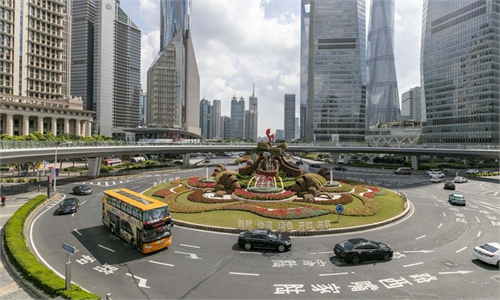China’s Pudong eyes breakthrough tech innovation
Integrated circuit, biotechnology industries to benefit from government blueprint

View of Pudong Photo: cnsphoto
When Lu Xiaowei started her career in Zhangjiang, a 17-square-kilometer farmland in Shanghai's Pudong New Area in 1993, there was little more than a deserted reed marsh, with no roads and little traffic.
Her decision, back then, was a bold one, and she can still clearly recall how she, along with other "pioneers," started from scratch in early days, endured hardship and painstakingly overcame lacks of all the tools needed to start a business.
But what's more pioneering in the 1990s was the decision of the China's top leadership. In 1990, China announced the development and opening up of Shanghai's Pudong, aiming to make the region a symbol of China's connection with the world and a vanguard of the takeoff of Chinese socialist market economy.
Zhangjiang is the first industrial park in China focused on high-tech. Over the past three decades, the area - a vivid display of Pudong's drastic transformation - has been built into a landmark of China's tech innovation. It is now home to more than 200 semiconductor companies with an industrial scale over 10 million yuan ($1.55 million), a "pharmaceutical valley" that produces one third of China's new medicine and an "island" for artificial intelligence (AI) that is valued over 27 billion yuan. More than 15 percent of companies born in Zhangjiang reportedly have been listed in Shanghai's STAR market.
"We have a theme-song for Zhangjiang industrial park. The lyrics go that everyone has a dream, and if we grow the seeds of dream, we will be able to see our dreams come true one day," Lu, now the general manager of asset operation division of Zhangjiang Group, told the Global Times.
30 years on, Zhangjiang as well as Pudong is on trajectory to realize these dreams. With companies and innovators now dreaming bigger, Pudong, in the coming years, will boldly shoulder the heaviest burden, "crack the hardest bone," striving to become a pioneer in reform and opening-up at a higher level, and a pioneer area for socialist modernization, according to a guideline issued by China's central government last month.
One task that Pudong will undertake is that it is set to become a "national team" and spearhead in leading breakthroughs in core technologies, which observers said is of critical importance as China scales up efforts to build self-reliant technologies amid a US-led tech crackdown.
Will Pudong be able to assume such a task? The answers can be seen everywhere through visiting Pudong, from illuminating skyscrapers in the night skies of Shanghai, to thousands of low-profile tech entrepreneurs who are making tech breakthroughs in what they call a spirit of "keeping one's feet on the ground and looking up at the stars," and to local officials who are forming the blueprint for the region's future development.
"Pudong is set to play a frontier role in China's tech map, and our biggest difference from other tech centers is the emphasis on tech innovation ability. We're not product-oriented. We build infrastructure, science facility and invest heavily in basic research, which we aim to improve our ability to make innovations - the key in international tech competition," Peng Song, a Pudong official, told the Global Times.
Chip industry
Among the various high technological industries that Pudong is building, integrated circuit is one of the focal points.
From the top level, the central government is also placing a lot of hope in Pudong to make breakthroughs across the integrated circuit industry.
Within the aforementioned guidelines, officials stressed that China will speed up constructing national science centers in Pudong's Zhangjiang area with a focus on integrated circuits, life science, artificial intelligence technologies and connected industries.
The guidance for Pudong to push its integrated circuit industries to a higher level came as the area already formed a powerful and completed integrated circuit industry chain over the years.
Home to domestic and overseas integrated circuit giants like Qualcomm, Cambricon and NVIDIA, Shanghai saw its integrated circuit industrial sales reach 207.13 billion yuan in 2020, up 21.4 percent year-on-year. Zhangjiang accounted for more than half of the sales, with its total integrated circuit sales reached 128.54 billion yuan last year, up 22.9 percent on a yearly basis.
The foundation has been set, where to next for Pudong?
Zhou Zhengyu, deputy director of the Shanghai Pudong Science and Economy Committee, pointed out several missions that Pudong will embark on soon to build integrated circuit industrial cluster. According to Zhou, the government will encourage key companies to target the world's most advanced techniques and technologies, directing them to catch up with or even surpass them.
Pudong will also encourage manufacturing capacity for mature integrated circuit process to ensure the stability of supply chains.
"From the government side, we will make arrangements on improving the business environment and ecosystem to facilitate companies' technological breakthroughs, but we will leave it to the companies to do the actual research work in partnership with research institutions and other platforms," he told the Global Times.
He also stressed that the government will invest in basic research facilities, such as building a national laboratory in Zhangjiang that will encompass integrated circuit technological research. The government will also offer favorable policies for integrated circuit talents who come to work in Pudong, such as subsidies, talent apartments and preferential taxation.
According to Zhou, Pudong's integrated circuit industry is on the verge of entering a "golden age," with capital support from the Science and Technology Innovation Board, opportunities generated during the coronavirus outbreak, and the efforts from domestic firms.
"As companies acknowledge that this is a good chance to develop the industry, and with the supportive policies and business environment, I believe that good opportunities will be generated through hard work," he said.
Internalization
In 1994, Swiss multinational healthcare company Roche Holding set up their Chinese headquarter in Shanghai's Pudong, making it the first foreign pharmaceutical company in the region. Now, the region has more than 1,000 companies involved in biomedicine and healthcare upstream and downstream industries.
Shen Hong, who is in charge of Roche's Shanghai Innovation Center, told the Global Times that the central government's guidelines will make Pudong more open and attractive to international talent, therefore enhance the region's biotechnology capacity.
"Pudong will not only serve the domestic market, it will also become an international pharmaceutical valley to serve global patients," Shen said.
For local AI companies, internalization is also one of the biggest advantages of Pudong, which enables them to export products to the massive global market.
In 2015, Gu Jie, the chairman of Shanghai Fourier Intelligence, quit his job in a foreign company and set up the rehabilitation robotics start-up in Zhangjiang.
"A lot of young people made similar decisions at the time, which is in tandem with the 30-year development footprint of Pudong: first attracting international companies to form a world class industrial cluster, then giving birth to local high-tech companies with global visions that are able to compete with foreign rivals," Ge told the Global Times
"The vibrant atmosphere in Pudong inspires us to create globally competitive technology, and based on the complete manufacturing chain of the Yangtze River Delta, we're able to quickly translate our research and development into products," Ge noted.
Fourier now sells its rehabilitation robots to more than 20 countries and regions, and according to Ge, the company's sales have outperformed most foreign rehabilitation robotics companies.
"The past trend of China focusing solely on domestic markets has ended, and as the door opens wider, more Chinese tech firms will gain footholds in international markets," Ge added.





